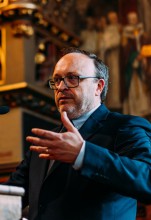
2022 marked the start of a new five-year cycle for UNU-CRIS, governed by the second Memorandum of Understanding between United Nations University (UNU), the Flemish Community, Ghent University and Vrije Universiteit Brussel (VUB), following a positive external evaluation and the decision of the Flemish Government at the Flemish Council of Ministers at the end of 2021. We thank our key stakeholders for their continued trust and support.
On May 24th the new MoU was formally signed in the Bruges Town Hall.
A strategic planning exercise was conducted in 2022 to further refine the Institute’s research agenda, take stock of our growing and diverse expertise, and define priorities for the next five years. Our last strategic plan was devised back in 2016, and the world has evolved since then, but UNU-CRIS has once again shown its agility and ability to adapt. As the UN’s research centre on regional and global cooperation and governance, it is our task to keep on top of trends and at the forefront of research on the most pressing issues across all levels of governance, and to do so, we are excited to introduce our new restructured and refocused research programme and a new strategic plan outlining how we will contribute to addressing these major challenges. The full text can be consulted on our website.
According to the new strategic Plan 2022-2026, our research is structured around three research programmes (the “3 R’s”) and several clusters. The study of governance and cooperation highlights the importance of regional organisations, despite facing strain from resurgent nationalist forces, as crucial yet underutilised entities in addressing cross-border issues in conjunction with other governance levels. Additionally, cities and substate regions have emerged as significant players on the governance spectrum, establishing themselves as powerhouses and engaging in international interactions.
In the 2023 report of the High-Level Advisory Board on Effective Multilateralism (A Breakthrough for People and Planet) the crucial role of regions in global governance was underlined once more: “While having widely differing capacities, regional organisations have a special set of responsibilities and roles that make them indispensable for addressing issues of global concern. The meaningful political and financial investment in regional bodies proposed in this report would align the UN system with the principle of subsidiarity, deliver greater legitimacy across the multilateral system, and address many of the shortcomings in global governance identified in Our Common Agenda” (p. 20).
The Regions and Cities Governance Lab (Re-LAB), our first programme, aims to explore the evolving role of governance levels beyond the nation-state, including substate regions, cities, and regional organisations undergoing reform.
The Regional Integration Knowledge System (RIKS), our second programme, aims to provide reliable information on regionalisation patterns within the global system, the development of regional organisations, and quantitative methods applied to regionalism studies. This programme also supports regional organisations and other authorities in developing indicator-based monitoring systems.
In today’s globalised world, cross-border issues pose the most significant challenges, as demonstrated by the Covid-19 pandemic and the war in Ukraine. Our largest programme, Regional Public Goods (RPGs), encompasses several clusters that analyse key policy areas, such as Migration and Social Policy, Economic Interactions, Digital Governance, and Nature, Climate and Health. The programme focuses on examining the structures within these areas and emphasises how greater cooperation can lead to greater benefits for all.
The challenges we face in the world are growing more urgent each day, and mere understanding of the situation is insufficient. We must strive to improve and correct our paths. At UNU-CRIS, through this focused and clear research programme, we not only research critical governance and cooperation issues but also provide policy-relevant output to guide policymakers in addressing these challenges.
2022 marked the return to (a new?) normality after the pandemic episode with a return to the office, and the return of visitors, interns, and in-person (or hybrid) events and trainings. We co-organised various in-person or hybrid events, including the UNU Climate Resilience Initiative in Maastricht, the EU-LATAM Symposium in Madrid, and several research seminars.
We were also glad to receive the visit of the Secretary-General of the Organisation of African, Caribbean and Pacific States, diplomats from Angola, Ghana and Belgium, university staff and student delegations from Indonesia, The Philippines, and The Netherlands, as well as visiting researchers from China, Finland, Germany, Italy, Mexico, Spain, and many more.
2022 also meant the start of new research projects with external funding and partners, including the Flemish Research Fund (FWO), the Organization of Eastern Caribbean States (OECS), TEPSA/European Parliament, FEPS, UNU-CPR/USIP, Finnish Work Environment Fund, and VVSG/IDEA, to name just a few.
Regarding capacity building, our three regular summer schools took place, of which the tenth (!) Doctoral School on Latin American, European and Comparative Regionalism was again organised in person at the Universidad Andina in Quito (Ecuador). The Summer School on Comparative Regionalism (in collaboration with Universitas Airlangga and M. Narikbayev KAZGUU University), and the School on Modern Diplomacy (in collaboration with the Diplomatic Academy of Vienna) were still organised online.
We also welcomed the first successful PhD defenses after the first MoU with UGent and VUB involved the funding of young PhD researchers, formally enrolled at one of the two universities and conducting their research at UNU-CRIS (Els Bekaert/UGent, Diana Potjomkina/VUB, Presca Wanki/ UGent).
Finally, 2022 was also the final full year in office of Rector David Malone. We thank him for his continued support of UNU-CRIS over the last ten years. His successor, Rector and UN Under-Secretary-General Tshilidzi Marwala, former Vice-Chancellor of the University of Johannesburg, took office in early 2023. He thus became the seventh UNU Rector. We are looking forward to working with him in the coming years.

Philippe De Lombaerde
Director of United Nations University Institute on Comparative Regional Integration Studies
